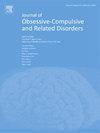Stigmatizing attitudes and endorsement of coercive interventions for hoarding
IF 1.5
4区 医学
Q3 PSYCHIATRY
Journal of Obsessive-Compulsive and Related Disorders
Pub Date : 2025-01-01
DOI:10.1016/j.jocrd.2024.100933
引用次数: 0
Abstract
Hoarding disorder is a stigmatized condition, but little research has examined the attitudes of professional service providers who encounter hoarding in homes they enter as part of their work. These providers have essential roles in identifying and intervening with hoarding, but the degree to which they hold stigmatizing attitudes has not been studied. Using an online questionnaire, the present study sought to compare hoarding service providers with non-professionals along several dimensions of hoarding stigma: blame, desire for social distance, stereotypes about incompetence, and the endorsement of coercive treatment methods were examined. Overall, members of the professional sample endorsed less blame and desire for social distance from hoarding clients. However, the samples did not differ in beliefs about the incompetence of hoarding clients or endorsement of coercive methods in hoarding interventions. Stigmatizing attitudes about mental illness in general consistently predicted hoarding stigma in both samples. Providers who expressed more professional confidence in working with hoarding endorsed less blaming attitudes and less desire for social distance, but providers who work in more enforcement-oriented roles endorsed desire for more social distance from hoarding clients. This study provides a first glimpse at hoarding-related stigma among professional service providers, and further insight into the general public's perception of hoarding relative to other mental illnesses. Findings about the predictors of hoarding stigma provide potential directions for anti-stigma interventions.
对囤积的污名化态度和强制干预的认可
囤积症是一种耻辱的疾病,但很少有研究调查那些在工作中遇到囤积症的专业服务提供者的态度。这些提供者在识别和干预囤积行为方面发挥着重要作用,但他们持有的污名化态度的程度尚未得到研究。通过一份在线问卷,本研究试图比较囤积服务提供者和非专业人士在囤积耻辱的几个方面:指责,渴望社会距离,对无能的刻板印象,以及对强制治疗方法的认可。总体而言,专业样本的成员认为,与囤积客户保持社交距离的人较少受到指责和渴望。然而,样本对囤积客户的无能或对囤积干预的强制方法的认可的看法没有差异。在两个样本中,对精神疾病的污名化态度总体上一致地预测了囤积污名。那些在治疗囤积症方面表现出更专业信心的医生赞同更少的指责态度和更少的社交距离,但那些更注重执法的医生赞同与囤积症患者保持更大社交距离的愿望。这项研究首次揭示了专业服务提供者中与囤积相关的耻辱感,并进一步深入了解了公众对囤积与其他精神疾病的看法。有关囤积病耻感的预测因素的发现为抗病耻感干预提供了潜在的方向。
本文章由计算机程序翻译,如有差异,请以英文原文为准。
求助全文
约1分钟内获得全文
求助全文
来源期刊
CiteScore
4.00
自引率
5.60%
发文量
46
审稿时长
47 days
期刊介绍:
Journal of Obsessive-Compulsive and Related Disorders (JOCRD) is an international journal that publishes high quality research and clinically-oriented articles dealing with all aspects of obsessive-compulsive disorder (OCD) and related conditions (OC spectrum disorders; e.g., trichotillomania, hoarding, body dysmorphic disorder). The journal invites studies of clinical and non-clinical (i.e., student) samples of all age groups from the fields of psychiatry, psychology, neuroscience, and other medical and health sciences. The journal''s broad focus encompasses classification, assessment, psychological and psychiatric treatment, prevention, psychopathology, neurobiology and genetics. Clinical reports (descriptions of innovative treatment methods) and book reviews on all aspects of OCD-related disorders will be considered, as will theoretical and review articles that make valuable contributions.
Suitable topics for manuscripts include:
-The boundaries of OCD and relationships with OC spectrum disorders
-Validation of assessments of obsessive-compulsive and related phenomena
-OCD symptoms in diverse social and cultural contexts
-Studies of neurobiological and genetic factors in OCD and related conditions
-Experimental and descriptive psychopathology and epidemiological studies
-Studies on relationships among cognitive and behavioral variables in OCD and related disorders
-Interpersonal aspects of OCD and related disorders
-Evaluation of psychological and psychiatric treatment and prevention programs, and predictors of outcome.

 求助内容:
求助内容: 应助结果提醒方式:
应助结果提醒方式:


